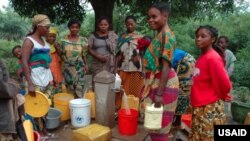Tanzanian organizations working in the water sector joined members of the development community in Dar es Salaam in late January, to mark the successful completion of the USAID-funded Tanzania Integrated Water Sanitation and Hygiene, or iWASH program, which supplied water to more than 200,000 Tanzanians and helped another 40,000 gain access to improved sanitation in schools and homes. In addition, more than 250,000 people learned about hygiene and sanitation, thanks to iWASH. The program was implemented by the Global Water for Sustainability consortium.
After six years of working to improve the health and economic resilience of some of Tanzania’s poorest rural and small town communities, iWASH draws to a close this month. The program supports sustainable, market-driven water supply, sanitation, and hygiene services, while also supporting the sustainable management of water resources.
Working with local implementing partners, iWASH has expanded access to these services in some of the least served communities in the regions of Morogoro, Njombe, and Iringa.
iWASH equipped Tanzanians to consolidate these gains over time, training more than a thousand people in water resource management and supporting 32 Tanzanian students with their post-graduate studies in water resources. The program also worked closely with the Ministry of Water and Irrigation and the Wami Ruvu Basin Water Office to improve sustainable management of water resources and watersheds.
“I am proud to say that the Wami Ruvu Basin benefited from the iWASH program. We now have a good base,” said Praxeda Kalugendo, Wami Ruvu Basin Water Officer. “We have many challenges ahead, but this program has helped us to develop tools and approaches for integrated water resource management.”
iWASH support allowed for the completion of an Environment Flow Assessment and Estuary Studies carried out for the Wami and Ruvu Rivers. The project also trained and mobilized 22 local private sector entities to carry out low-cost drilling throughout Tanzania.
“Access to water is essential,” said Gilbert Kajuna, USAID’s Tanzania Deputy Team Leader for Natural Resource Management. “USAID is proud to have worked in partnership with the Government of Tanzania, local NGOs, the private sector, and universities to bring productive use of water to more than 3,700 households.”






